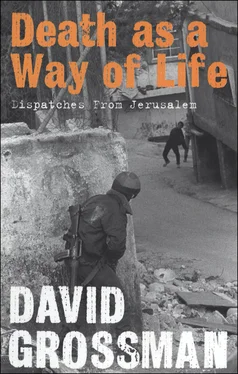David Grossman - Death as a Way of Life
Здесь есть возможность читать онлайн «David Grossman - Death as a Way of Life» весь текст электронной книги совершенно бесплатно (целиком полную версию без сокращений). В некоторых случаях можно слушать аудио, скачать через торрент в формате fb2 и присутствует краткое содержание. Год выпуска: 2013, Издательство: Bloomsbury Publishing, Жанр: Прочая документальная литература, на английском языке. Описание произведения, (предисловие) а так же отзывы посетителей доступны на портале библиотеки ЛибКат.
- Название:Death as a Way of Life
- Автор:
- Издательство:Bloomsbury Publishing
- Жанр:
- Год:2013
- ISBN:нет данных
- Рейтинг книги:5 / 5. Голосов: 1
-
Избранное:Добавить в избранное
- Отзывы:
-
Ваша оценка:
- 100
- 1
- 2
- 3
- 4
- 5
Death as a Way of Life: краткое содержание, описание и аннотация
Предлагаем к чтению аннотацию, описание, краткое содержание или предисловие (зависит от того, что написал сам автор книги «Death as a Way of Life»). Если вы не нашли необходимую информацию о книге — напишите в комментариях, мы постараемся отыскать её.
Death as a Way of Life — читать онлайн бесплатно полную книгу (весь текст) целиком
Ниже представлен текст книги, разбитый по страницам. Система сохранения места последней прочитанной страницы, позволяет с удобством читать онлайн бесплатно книгу «Death as a Way of Life», без необходимости каждый раз заново искать на чём Вы остановились. Поставьте закладку, и сможете в любой момент перейти на страницу, на которой закончили чтение.
Интервал:
Закладка:
I
“And now,” the newscaster chortled, “they’re shaking hands!” And then he added, in a hushed and astonished whisper, “They’re simply — shaking hands.”
Through nearly one hundred years of conflict, the two peoples have been in physical contact untold times, especially during the last sixty years. There have been thousands of moments in which body brushed body. For the most part, these have been violent encounters. The aspirations, anger, and distress of one people drained suddenly into the blade of a knife, or crystallized into a flying rock. And the aspirations of the other people, with their anger and fears, would transmogrify into lead bullets, clubs, police handcuffs, and soldiers.
On the face of it, the contact in the ceremony on the White House lawn was really the contact of two symbols. For many of his countrymen, Yitzhak Rabin is the prototypical Israeli. He symbolizes, almost stereotypically, the Sabra, the new Israeli Jew. He’s native-born, fought in the War of Independence, rose to the rank of chief of staff, and led the army to its great victory in the Six-Day War. He’s the salt of the land of Israel.
To the Palestinians, Rabin symbolizes the evil of the Israeli occupation. They cannot forget his order at the beginning of the Intifada to “break their bones.” They see him as the essence of Israeli militarism, cruelty, and callousness to their suffering.
Arafat, to many Israelis, is the prototypical enemy. To them he’s crafty, slippery, and can’t be trusted. If you turn your back on him, they fear, he’ll stab you. For thirty years, Israel’s leaders have taught their people to view Arafat as a two-legged beast, Hitler’s heir, a creature not fit for human society, who under no circumstances can be a partner in a dialogue.
But most Palestinians see Arafat as a symbol of the Palestinian life force. He represents survival in the face of hardships and persecution. For them, Arafat is the oppressed and wretched refugee who finally — thanks to his patience, courage, and determination — will win what he has demanded from his powerful and heartless enemy.
Two symbols shook hands, and the contact suddenly became human. It is a kind of contact consisting of reluctance and revulsion, as well as instinctive curiosity, and even a smile. Contact between two flesh-and-blood human beings.
The two made painful concessions in the Declaration of Principles. On each side there are individuals who oppose the agreement and who see it as a defeat for their leader. But none of the opponents — not among us and not among the Palestinians — can offer an alternative course of action that has any real value.
Rabin knows deep in his heart that he has, with his own hands, established the Palestinian state he has so feared. Arafat understands that he has given up his dream of establishing a greater Palestine that would include the territory on which Israel stands. Israel will have to accept armed Palestinian police forces, the Palestinians an Israeli military presence on the border between Israel and Jordan. Israel has made an immediate and concrete concession of territories and security assets. The Palestinians have, for the time being, conceded mostly aspirations and dreams. Yet I do not really know which side has made the more painful concession.
II
For many long years the Palestinians stood outside history. They lived within larger-than-life mythical memories of the past and aspirations for a heroic future. Like children embroidering fantasies of comfort and revenge out of the threads of their pain, they sought to flee the oppressive and humiliating present. In such unrealism, such conditions of weightlessness, hopes become entirely disconnected from the possible. For years the Palestinians cultivated illusions and believed in them. It has been embarrassing and galling to read the Palestinian National Covenant, its definition of the “Palestinian identity,” the statement of the Palestinian state’s goals, and to compare them to reality and to the geopolitical balance of power in the region.
The agreement made with the Palestinians will return them to history. If a people receive a place of their own, they can also return to time, to the natural progress of history. With such a people, one can begin to conduct negotiations between equals and to establish tolerable neighborly relations.
I don’t wish for anything more than that, but also not for anything less. Unlike many Israelis — including many on the left — I do not seek a “let’s make up and never see each other again” kind of peace, or a high and impenetrable wall between Israel and Palestine.
I believe that the best thing for the two peoples is to maintain as many connections of different kinds as possible. Economic, commercial, cultural, touristic, and athletic ties, in order to peg the new tent we’ve erected to the ground of reality with thousands of ropes and tent pins.
We should keep in mind that these are two industrious, ambitious nations, quick to adjust to new situations. Although we have ignored and dismissed each other as nations for many years, on the individual level it has been possible to sense that we have here two peoples with a natural ability to talk with each other. There are similarities of character and temperament, even senses of humor.
I should stress that I am not speaking of love between the nations. There is no place here for idealization. Not for the Palestine Liberation Organization, which has committed especially repulsive acts in its years of struggle (one entry requirement has been proof that the candidate has murdered a Jewish child and abused the body), and certainly not for the Palestinians as a people, whose culture, values, and very being have been worn down by decades of oppression by the Turks, the Jordanians, and the Israelis. It is not only power that corrupts. Weakness can be no less corrupting. Even the Intifada, which began as a heroic initiative of a nation seeking liberty, became in the space of only two years a welter of mutual killings, a rebellion run by religious extremists and common criminals. Yet despite it all, we would not have reached the current agreement without the Intifada.
I can certainly understand that the Palestinians loathe Israel, which to them looks like a militaristic, cruel, oppressive state. Despite its attempt to conduct an “enlightened occupation” (a conceit at best — no such thing is possible), the behavior of the Israel Defense Forces during twenty-six years of occupation has left major scars in the Palestinian collective memory. The state of occupation has been debilitating for Israeli democracy and for the rule of law. Violence has permeated our lives. I don’t know how many years will go by until children on both sides cease being afflicted at birth with hatred.
But who can hope for love between nations? Who really loves anyone in this world? (Of course, I’m referring not to people but to nations.) Do the English love the French? Do the Germans love the Russians? Perhaps we should even ask: Do the West Germans and East Germans love each other?
“Interests” is the key word, and it is the guarantee that the agreement will work. The two peoples have signed on to the agreement because they understand that they have no other choice. After decades of mutual bloodletting, they have come to terms with the idea that if they do not live side by side they will perish together, in a maelstrom that will engulf the entire region. It is existential interest that pushed these two reluctant peoples into each other’s arms. The United States and Japan, and the Europeans led by Germany, now have to turn peace into a practical and enticing option for both sides. A flourishing economy, new jobs, a sense of freedom, reinforcement of everything in life that was damaged or paralyzed during the years of occupation and Intifada — all these can significantly strengthen those Palestinians who want peace. Similarly, the right-wing extremists in Israel will have difficulty arguing with a concrete improvement in the economy, in the quality of life, in the sense of security. The fundamentalists of Hamas will fight a war of despair and no quarter. They will try to create a nightmare atmosphere. Only a robust creative reality, full of life and hope, will succeed in withstanding them. We need to begin creating that reality now, immediately.
Читать дальшеИнтервал:
Закладка:
Похожие книги на «Death as a Way of Life»
Представляем Вашему вниманию похожие книги на «Death as a Way of Life» списком для выбора. Мы отобрали схожую по названию и смыслу литературу в надежде предоставить читателям больше вариантов отыскать новые, интересные, ещё непрочитанные произведения.
Обсуждение, отзывы о книге «Death as a Way of Life» и просто собственные мнения читателей. Оставьте ваши комментарии, напишите, что Вы думаете о произведении, его смысле или главных героях. Укажите что конкретно понравилось, а что нет, и почему Вы так считаете.












